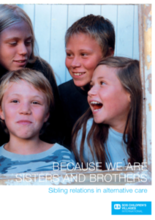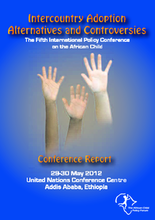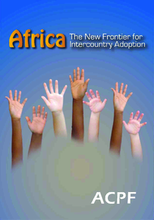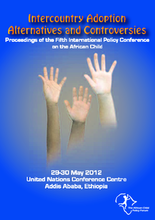Displaying 12941 - 12950 of 14579
This publication by SOS Children’s Villages International brings together research findings, learning and policy recommendations about sibling relations in alternative care gathered from five different SOS Children’s Villages associations (Germany, Austria, France, Italy, and Spain).
This document provides an overview of The Fifth International Policy Conference on the African Child held on 29-30 May 2012 at the United Nations Conference Center Addis Ababa, Ethiopia. The overall goal of the Fifth IPC was to further the discussion on intercountry adoption and to contribute to the improvement of national laws, policies, systems and procedures relating to intercountry adoption.
This publication was prepared as a background document to inform the discussions and debates during the Fifth International Policy Conference on the African Child held on 29-30 May 2012 in Addis Ababa, Ethiopia. This report provides a situational analysis of the law and practice of intercountry adoption in Africa, with the aim of informing debate on conceptualizing, developing and implementing policies, laws, and programs and research in relation to intercountry adoption in Africa.
The Proceedings report presents summaries of all presentations delivered and of all plenary discussions held during each session of the Fifth International Policy Conference on the African Child (IPC) held on 29 and 30 May 2012 in Addis Ababa, Ethiopia, which brought together experts, policymakers, and key stakeholders to discuss various issues and the implications of intercountry adoption in Africa.
This document from the National Statistical Service of the Republic of Armenia provides an overview and assessment of the alternative care system in the country.
This paper investigates the time–space practices of young people caring for their siblings in youthheaded households affected by AIDS in Tanzania and Uganda. Based on qualitative exploratory research with young people heading households, their siblings, NGO workers and community members, the article develops the notion of sibling ‘caringscapes’ to analyse young people’s everyday practices and caring pathways through time and space.
This guide provides step-by-step guidance and recommendations on how to identify and address gender-related issues that negatively affect vulnerable boys and girls in the local program context. It is intended to be a practical tool for staff involved in the design, implementation, monitoring and evaluation of care and support programs for vulnerable children. It provides directions and recommendations for programs to identify and address gender-related issues that negatively affect vulnerable boys and girls in the local program context.
In light of these challenges, during the summer of 2011, the International Organization for Adolescents (IOFA) conducted a needs assessment in Addis Ababa, Ethiopia that focused on identifying the strengths, needs, and risks of orphaned and vulnerable adolescents who are transitioning to independence. The data collected has served to inform the overall Transitions Initiative, led by IOFA, which aims to establish a comprehensive support system for youth aging out of care and to build awareness around the issues that this vulnerable population confronts
This paper focuses on appropriate responses to the unique challenges faced by young people at risk who are transitioning out of state care in South Africa.
The present study explories the preparation for adulthood experiences of young Ghanaian care-leavers with a particular focus on sources, needs and barriers to preparation for leaving care.





